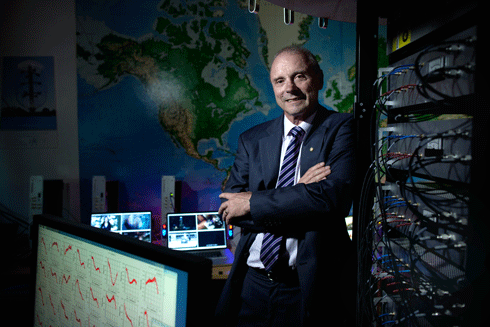
|
Published: 25 June 2012
CSIRO team wins international award for WLAN technology
The CSIRO team that invented a faster system for wireless local area networking (WLAN) – which later became the foundation of wireless networking technology (Wi-Fi) – has won a European Inventor Award 2012.

|
|
Dr John O’Sullivan, one of the CSIRO team that invented the WLAN technology on which Wi-Fi is based. Credit:
European Patent Office
|
CSIRO inventors Dr John O’Sullivan, Dr Terry Percival, Mr Diet Ostry, Mr Graham Daniels and Mr John Deane were named as the winners of the ‘Non-European countries’ category of the annual European Patent Office awards, at an awards ceremony in Copenhagen. This is the first time an Australian team has won the award.
The patented WLAN technology, which enables us to work wirelessly in our homes and offices, is now estimated to be in more than three billion devices worldwide and expected to be in more than five billion devices by the time the CSIRO patent expires at the end of 2013.
‘When we started this research, there were wireless systems being built to talk to computers but they ran very slowly,’ says Dr Terence Percival.
This invention started out with research on black holes and radio astronomy.
‘The performance of the available WLAN solutions was mediocre. There were many problems that needed to be solved, but in essence it turned out that the problems we had to solve in radio astronomy back then with black holes and later with WLAN were remarkably similar,’ says Dr John O’ Sullivan.
‘The biggest challenge with WIFI is the indoor environment, where radio waves bounce off the walls. In order to make WIFI work we employed a number of techniques. The first was to break the signal down into a number of sub-channels. So, by sending the data over multiple channels at once, we were able to slow the data rate down so that the echoes weren’t such a big concern,’ says Dr Percival.
‘Even then, you’ve still got errors.’
‘And that is where we use what’s called “error correction coding”. You add a little bit of redundancy and that allows you to detect where bits are missing and correct them,’ says Dr Sullivan.
‘We’re thrilled for the team to receive this international recognition for an invention that has had such a significant global impact,’ says Nigel Poole, CSIRO’s Acting Group Executive for Information Sciences.
Source: CSIRO and European Patent Office
More information
CSIRO wireless and networking technology laboratory



